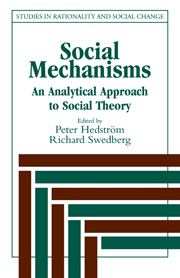
Class Practices
How Parents Help Their Children Get Good Jobs
£38.99
- Author: Fiona Devine, University of Manchester
- Date Published: April 2004
- availability: Available
- format: Paperback
- isbn: 9780521006538
£
38.99
Paperback
Other available formats:
Hardback, eBook
Looking for an inspection copy?
This title is not currently available on inspection
-
This important new book is a comparative study of social mobility based on qualitative interviews with middle-class parents in America and Britain. It addresses the key issue in stratification research, namely, the stability of class relations and middle-class reproduction. Drawing on interviewee accounts of how parents mobilised economic, cultural and social resources to help them into professional careers, it then considers how the interviewees, as parents, seek to increase their children's chances of educational success and occupational advancement. Middle-class parents may try to secure their children's social position but it is not an easy or straightforward affair. With the decline of the quality of state education and increased job insecurity in the labour market since the 1970s and 1980s, the reproduction of advantage is more difficult than in the affluent decades of the 1950s and 1960s. The implications for public policy, especially public investment in higher education, are considered.
Read more- Based on unique original research
- Takes a US/British comparative approach
- Addresses key debates about education in a changing world
Reviews & endorsements
'It is an absolute pleasure to read and in my view is one of the most theoretically and methodologically sophisticated books within sociology and the sociology of education to have been published in the last decade or more … Devine's book has the real feel of an insider …'. Journal of Social Policy
See more reviews'This is a fantastic book that adds much to the growing collection of literature on middle-class practices, higher education and the perpetuation of class privilege. It is well written, intelligent and accessible, enabling undergraduate use as well as providing an excellent study for those in higher levels. Devine offers a powerful analysis of the everyday micro practices of class advantage, and for all of this Devine should be applauded.' Sociology
Customer reviews
Not yet reviewed
Be the first to review
Review was not posted due to profanity
×Product details
- Date Published: April 2004
- format: Paperback
- isbn: 9780521006538
- length: 298 pages
- dimensions: 228 x 152 x 19 mm
- weight: 0.485kg
- contains: 4 tables
- availability: Available
Table of Contents
1. Introduction
2. Material help with education and employment
3. Financial choices and sacrifices for children
4. Expectations and hopes for educational success
5. Fulfilling potential and securing happiness
6. Contacts, luck and career success
7. Friends and networks in school and beyond
8. Conclusion
Appendix A. The interviewees
Appendix B. Doing comparative research
Notes
Bibliography.
Sorry, this resource is locked
Please register or sign in to request access. If you are having problems accessing these resources please email [email protected]
Register Sign in» Proceed
You are now leaving the Cambridge University Press website. Your eBook purchase and download will be completed by our partner www.ebooks.com. Please see the permission section of the www.ebooks.com catalogue page for details of the print & copy limits on our eBooks.
Continue ×Are you sure you want to delete your account?
This cannot be undone.
Thank you for your feedback which will help us improve our service.
If you requested a response, we will make sure to get back to you shortly.
×



